Feed aggregator
FWG Monthly Newsletter November 2023
Quietly now – it’s NaNoWriMo, and many writers are hard at work on completing the annual 50k words in a month challenge! Best of luck to those of you who are taking part – either with the official goal, or with your own targets. Just remember, any amount of writing is more than you had before!
Of course, with NaNoWriMo here, that means Furry Book Month has come to an end. I hope readers and writers alike were able to find some new books – especially through the book bundles the guild ran. We will be in contact with the contributing authors soon to pass on their royalties.
We will also soon start to open discussions about the possibility of restarting Oxfurred Comma next year, to determine what the members of our community would like to see, and if the event is feasible going forward. Either way, it is likely that some change of format will be required to ensure that we don’t have a repeat of this year’s attempt.
For those trying NaNoWriMo a different way and trying out some short stories instead of novels, there are some open markets that may provide some inspiration:
Altered States: Draconic Desire – Deadline November 30th 2023
Get Wild – Deadline December 1st 2023
Sniff – Deadline December 1st 2023
Night of the Howling Dead – Deadline December 8th 2023
Indulge – Deadline January 31st 2024
Androids and Dragons – Deadline When Full
Indecent Exposure – Deadline When Full
This Is Halloween – Deadline When Full
Furry Femdom Erotica – Deadline When Full
F/F No Erotic Anthology – Deadline When Full
Isekai Me! – Deadline When Full
Children Of The Night – Deadline When Full
Furry/Lovecraftian/Erotic/University Themed Anthology – Deadline When Full
Beyond Their Pale – Deadline When Full
#ohmurr! – Deadline: Ongoing
And if you’re looking for some inspiration in the form of recently released or upcoming books, then we have you covered as well! Who knows – maybe your current project will be listed here soon.
The Price of Thorns, by Tim Susman. Available for pre-order. Released November 14th 2023.
Commander Annie and Other Adventures, by Mary E. Lowd. Available for pre-order. Released November 14th 2023.
Peace And Love, by Huskyteer. Available for pre-order. Released December 1st 2023.
For those of you who bought books during Furry Book Month, your journey may not be over yet! If you have enjoyed reading what the furry writing community has to offer, please let people know! Either through reviews, recommendations, or contacting the authors directly.
Until next month, happy reading and writing!
J.F.R. Coates
Bearly Furcasting S4E27 - Still No Taebyn, But Substipup
MOOBARKFLUFF! Click here to send us a comment or message about the show!
Taebyn is still missing in action, but never fear for we have special guest co-host Pup Dawson! In this fun filled episode we chat about all the normal BFFT things and get to know Pup Dawson from the Off Leash! podcast. We tell some jokes, learn some new words, discover the wonderful world of herpetology. Don't miss this episode!
Taebyn YouTube
This podcast contains adult language and adult topics. It is rated M for Mature. Listener discretion is advised.
This podcast contains adult language and adult topics. It is rated M for Mature. Listener discretion is advised.
Thanks to all our listeners and to our staff: Bearly Normal, Rayne Raccoon, Taebyn, Cheetaro, TickTock, and Ziggy the Meme Weasel.
You can send us a message on Telegram at BFFT Chat, or via email at: bearlyfurcasting@gmail.com
On the Throne in the Palace of the Kingdom of the…
20th Century Studios just dropped the first trailer for The Kingdom of the Planet of the Apes, the fourth film in the “new arc” of ape science fiction movies. (For what looks to be an interesting film, they sure saddled it with a clunky-sounding title. Come on, people! What’s wrong with Kingdom of the Apes?) The official synopsis goes like this: “Kingdom of the Planet of the Apes is set several generations in the future following Caesar’s reign, in which apes are the dominant species living harmoniously and humans have been reduced to living in the shadows. As a new tyrannical ape leader builds his empire, one young ape undertakes a harrowing journey that will cause him to question all that he has known about the past and to make choices that will define a future for apes and humans alike.” It’s directed by Wes Ball (The Maze Runner), who meanwhile is now getting to work on an adaptation of The Mouse Guard! Kingdom is set to be released in theaters on Memorial Day (May 24th) in 2024.
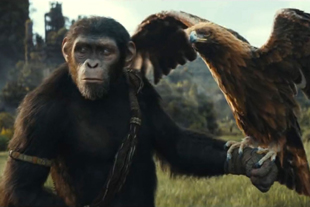
image c. 2023 20th Century Studios
Puplift: A Dog's Guide to Space🐕 🚀 Ch.5: A Day!

You're a dog in the future—what do we do in a day? A dog from the future explains a pleasant interstellar society in this sci-fi audio series. This series explores the topics of transhumanism, animal uplift, space travel, realistic artificial intelligence, terraforming, and a future you'd want to live in. Allison & The Cool New Spaceship Body https://shipfolk.neocities.org/Shipfolk.html Music: "Dew" by Jinpa https://soundcloud.com/user-975748551-495337716 Writing & Narration: Tempe O'Kun https://www.furaffinity.net/user/tempo321/ Merch, Sweet Tees and stuff: http://www.culturallyfd.com https://teespring.com/stores/culturally-fd-merchandise Support Culturally F'd: https://www.patreon.com/culturallyfd Plus a Newsletter: http://tinyurl.com/gsz8us7 Listen in on TEMPO TALKS with Tempe O'Kun https://www.youtube.com/playlist?list=PLIPk-itLl1jPyIK2c7mK-LpbvfDNqfcSW Check out Tempe O'Kun's books "Sixes Wild" and "Windfall" here: http://furplanet.com/shop/?affillink=YOUTU2907 Here's a playlist of his other Culturally F'd videos: https://www.youtube.com/playlist?list=PLIPk-itLl1jPS7tnT4hdJwBI-CeLF8Kb_ #hopepunk #scifi #science #fiction
A Short Answer to a Lot of Drama
I work on creative games and mods to bring joy to others. My adapted symbol is the spotted hyena, which I chose for its misunderstood perception, dangerous nature, and intelligence.
I've known about your website for a long time and I know you to be experienced in life. Do you have experience in dealing with narcissists online?
I used to not be aware of their existence until recently and this experience involved three at once. I created a mod for a video game and entered its community. It turned out I had walked into a war of sexual assailants. They deserve to not be named - that would only validate them. Therefore, I will call them N1-3. All three are known in a different related community. N1 was expanding into the community I entered. He used me as a stepping stone. He exploited that I had been betrayed by friends to paint himself to be in similar shoes and filled that void in my life for 2 years. Through his manipulation and the manipulative actions of his former right-hand man, N3 - who had forsaken him and was dragging this new community into the conflict - I believed N1 to be a victim and involuntarily became his defender. N1 slipped up, allowing me to recognize what he is and I broke free. He was not the only one to slip up. N3 personally involved me and my project in a public call out of N1 despite my wishes. When confronted, he tried hard to justify it (mainly to himself) and distracted from the issue by attacking my character. Such an action lead me to gravitate more toward N1. It also had me feel like I was walking on eggshells. As a result, I uncovered the full story. One constant question I had was how did these people become friends in the first place? I found the answer: They're all narcissist manipulators.
Here's what they did:
N1 built a harem of ride-or-die fans. He abused many women online (and some offline) and painted himself as the victim or downplayed his actions. I'll list the main incidents. He coerced a woman younger than him (W1) with future faking and special rewards into sending sexual cosplay photos then blackmailed her with the possibility of reposting them. N1 rewrote history that it was W1 who initiated. He also made her feel she was in a competition with another woman (W2). He underpaid a co-worker (W3) and visited her to have sex with her despite her clearly saying no beforehand. (W3 was in a relationship too.) He confessed to W3 about getting W4 drunk to sleep with him and cry to her boyfriend afterward. W3 was able to resist him. After the unsuccessful endeavor, he would berate W3 until she stopped working for him. He was ultimately exposed by another co-worker - let's call her Ocarina - when she accused him of sexual assault at a con. N1's key lie is that Ocarina wanted to share a bed with him - the resulting argument being they were both in the wrong (did I mention Ocarina was in a relationship with another person too?), but in reality, she only wanted to share costs on the room and expressed she was very uncomfortable about sharing a bed when it turned out the room didn't have separate beds. They both got drunk and N1 took Ocarina back to their room despite her friends' protests. They both stated that bodily contact happened. Their stories differ on the details, intentions, and states of consciousness.
N2 guilt-tripped a fan into a date - let's call her C. The date took place near her city but far enough for her to feel isolated from her family. C expressed discomfort multiple times, but was successfully coerced into spending the night at N2's hotel room. N2 pressed for sex and a condom broke. Their stories differ on what happened afterward. N2 tried to rewrite history that C never clearly communicated what she wanted.
N3 was N1's righthand man. He defended N1 until Ocarina then switched to defending N2. He makes everything about himself and used the stories of N1's victims to prove to himself that he did nothing wrong. He made a video targeting newcomers. He didn't show anything of the victims' stories that did not pertain to himself, thereby leaving doubt about the validity of the accusations against N1. N3 is also ignorant of N2's actions and paints him in a positive light with lies by omission.
The complication here is that all of these were friends. N2 championed for Ocarina, leading the call out of N1. C reappeared at that time to accuse N2 of rape for the second time. N2 remained silent and let Ocarina and her friends who attended the con to defend him from C. They involuntarily became N2's apologists. One of the friends made an anonymous account to help expose N1 and this account was used to defend N2 as well. Ocarina got hacked and the burner account got exposed. All this allowed N1 to return, arguing that these are hypocrites who tried to cancel him.
As you can see, this is a complicated story. Untangling it with no prior knowledge of narcissist manipulation tactics was an ordeal, but I believe everything in life happens for a reason. I got through it and emerged stronger.
The problem is that these two communities are filled with teens and young adults who are not mature enough to understand the weight of the situation. They interpreted it as drama and picked their favorite creator to defend.
I will continue to be involved with one of the communities through my hobby (for at least a little while), which is already poisoned with a lot of in-fighting due to N1's shift into this community. I am bound to get asked for input about N1 since some of my popularity is due to him. Do you have any advice on how to handle it? I know talking about N1 either positively or negatively validates him, but I do not want these young adults to be left in the dark and falling prey to manipulation from either side. I got rid of my YouTube account kickstarted by N1. I plan to just not talk about him anymore. However, I have already drawn the rage of N1's most religious followers by disassociating. These followers can potentially get other people entangled in such manipulation. I don't know how to handle it. Do you happen to have any advice?
Thank you in advance and stay safe, Papabear.
- Kartal
* * *
Dear Kartal,
You're right, this is complicated. First, let's clear something up: These people are not "narcissists." The appropriate term for all of them is "immature assholes," who are also apparently guilty of sexual assault. In short, these are very bad people, and if you are wise you will disassociate yourself from all of them. I would also argue that saying they are (or were) "friends" is highly inaccurate because friends do not treat each other in this manner.
Secondly, while it is noble of you to think of the young people in these groups who might get sucked into the N1-3 drama, it is really not your job to patrol the groups and act like a police officer. If you try, I guarantee that you will not be successful and will only be dragged farther and farther, deeper and deeper into a pool of disgusting drama.
Kartal, you are not responsible for the way people behave and you will find that trying to change people who are bad actors is a fruitless endeavor best left to professionals in the mental health industry.
One of the greatest skills to acquire in life is how to be a good judge of people. Once you do this, you will live a happier life by surrounding yourself with good, true friends and family and stepping away from the immature, the manipulators, the selfish, the gaslighters, and the cruel. True friends are kind, loving, and supportive. Anything less makes them not friend material.
So, step away from these communities like you were backing away from a minefield.
Does this make sense?
Good Luck!
Hugs,
Papabear
Do people in China know about furry? w/Yuho and Leola

Does China know what furry is? Listen to what Yuho has to say. Catch the full episode here: https://youtu.be/przMsklgh3I ---- Social Media: Official FABP Twitter: https://twitter.com/foxandburger Michael: https://twitter.com/foxnakh https://www.youtube.com/channel/UCK9xoFQrxFTNPMjmXfUg2cg Burger: https://twitter.com/L1ghtningRunner ---- #foxandburger #shorts #snippet #furry
All The Pretty Little Furry Things
Karen Alleluia is a book illustrator and character designer. She says this at her web site: “I am a Filipina-American freelance illustrator who creates charming art that inspires learning and shares messages of positivity. I began my career by having fun with my two chihuahuas, Bandit and Fatboy, and after a year of drawing their funny and relatable adventures, my obsession for storytelling inevitably grew beyond my home setting.” To that end she has created an extensive collection of pins, stickers, charms, plushies, and other original crafts featuring a variety of cute funny animals. Spend some time there.
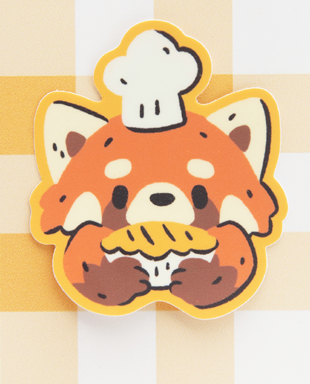
image c. 2023 by Karen Alleluia
TigerTails Radio Season 15 Episode 00

TigerTails Radio Season 15 Episode 00. Join the Discord Chat: https://discord.gg/SQ5QuRf For a full preview of events and for previous episodes, please visit http://www.tigertailsradio.co.uk. See website for full breakdown of song credits, which is usually updated shortly after the show. If you like what we do and wish to throw some pennies our way to support us, please consider sending a little tip our way. https://streamlabs.com/tigertailsradio/tip * Please note, tips are made to support TigerTails Radio and are assumed as made with good faith, so are therefore non-refundable. Thank you for your support and understanding.
Art Is Not Dead
Another artist we met at Lightbox Expo was Megan Brain — yes that’s her name. Her specialty is an unusual one: Cut and folded paper sculptures. Sounds simple enough, but wait until you see what she does with it! She has been creating amazing and unique works for customers big and small for a while now. And more recently she’s been recreating some of her paper works as collectible pins too.
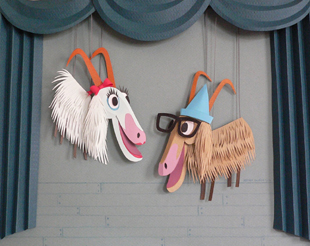
image c. 2023 by Megan Brain
All the Pretty Animals
This weekend we made a quick stop by the Lightbox Expo, an annual animation industry trade-show in Pasadena, California. Lots and lots of artists showing off their talents there, and lots of animation studios looking for help. Among the former was an artist all the way from France named Julie Mellan. Her specialty is traditional “funny animals” drawn in a very sweet style and colored in traditional inks and watercolors. (She even created the cover for the book The Last Rabbit by Shelley Moore Thomas, which we’ve reviewed here before.) You can see a lot of Ms. Mellan’s work at her web site — or, you can pick up her book Instants — The Art of Julie Mellan, and hold the art in your own two paws!
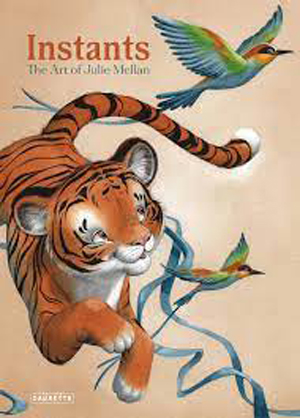
image c. 2023 by Julie Mellan
The Soldier of Night Returns
If a spooky monster story-line worked once, why not bring it back again? Especially just in time for Halloween! We’ll let Marvel Comics explain this one — they’re better at it than we are. “In the early 90s, Steve Rogers transformed into Capwolf in writer Mark Gruenwald and artist Rik Levins’ unforgettable ‘Man and Wolf’ story arc. [Captain America #402-408. Comic Book Resources has a review — ye ed-otter] Now over 30 years later, Capwolf is back in his own limited series, Capwolf & the Howling Commandos! Written by Stephanie Phillips and drawn by Carlos Magno, this four-issue limited series will tell an all-new story where Steve becomes a terrifying werewolf during an early World War II mission. Luckily, his fiercest allies are by his side: Nick Fury and the Howling Commandos! After years of combat, this elite squad of soldiers thought they’ve seen it all but this might be their wildest adventure yet as the series captures the spirit of Stan Lee and Jack Kirby’s classic wartime storytelling with a modern mystical twist!” The first issue just hit the stands. Start a howl!
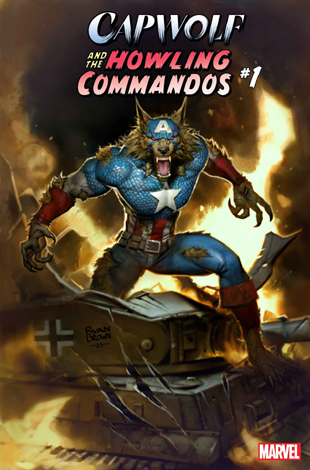
image c. 2023 Marvel Comics
Digging Up Positivity – October 2023

The October edition of Digging Up Positivity explores the latest charity and art highlights and features furry photographer Mylo (FennecParty).
Bearly Furcasting S4E26 - Taebyn is a Tool
MOOBARKFLUFF! Click here to send us a comment or message about the show!
Moobarkfluff! Taebyn is off this episode attending a Tool concert, so Bearly and Rayne do their best to make this a fun episode. We have a chat about audio tape and film stock, play some M*A*S*H trivia, and Bearly reads a tale from the Brother’s Grimm. So come hang out with us for spell! Moobarkfluff all you furs!
This podcast contains adult language and adult topics. It is rated M for Mature. Listener discretion is advised.
Thanks to all our listeners and to our staff: Bearly Normal, Rayne Raccoon, Taebyn, Cheetaro, TickTock, and Ziggy the Meme Weasel.
You can send us a message on Telegram at BFFT Chat, or via email at: bearlyfurcasting@gmail.com
Finally Starting to Get Crabby
So to speak… We’ve been hearing about the new CGI film Under The Boardwalk for a while, but mostly about its release getting delayed again and again. (Seems to be a trend these days.) Now thanks to Cartoon Brew we found out it’s actually coming out — in a rather rushed manner, with almost no advertising. The movie will be coming to Paramount+ streaming in a few days, and today it begins a limited run in theaters… while also today, Paramount released the very first trailer to the Internet. ““When timid Jersey crab Armen meets bold tourist sea crab Ramona, it causes shell-shocking tension in the community. But when the duo are swept away by a storm, they embark on an epic journey to find home. Their courage unites their families, paving the way for great summers to come, Under the Boardwalk.” Director David Soren is known for animated films like Captain Underpants: The First Epic Movie and Turbo.
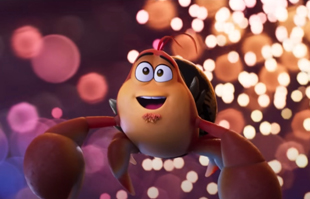
image c. 2023 Paramount Pictures
Rooview: Lookouts
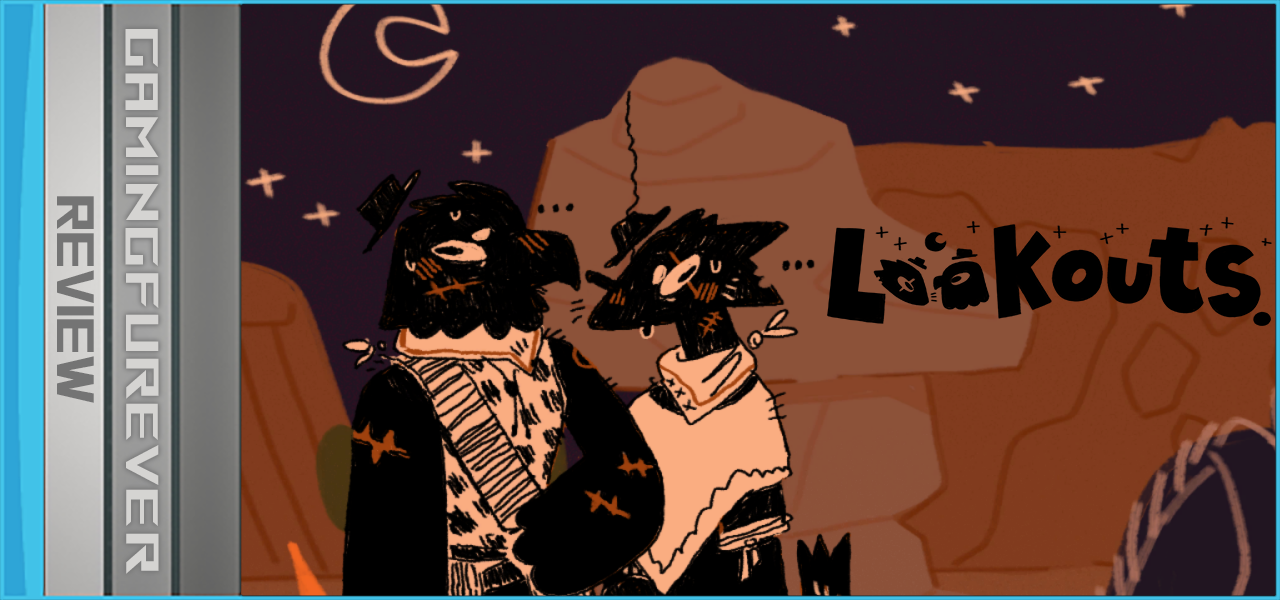
Lookouts is a visual novel Western adventure where you play as a one armed wolf scout for a notorious gang. The 2022 Ursa Major nominated game is available to play in browser, or pay what you want to download at itch.io. It features art by Coldoggo, music by Jamie, and ParanoidHark composing the story and programming.
The art seems to take inspiration from Northwest Indigenous styling to form simple and effective character silhouettes for use in the story. The form not only lends itself well to the Western format, it makes the artstyle instantly recognizable and stand out from its other visual novel peers.
The story is split into a simple three act structure. As far as gameplay goes, the story is linear with some minigames and very sparse and inconsequential choices to start. It is not until the third act during the final conflict where you will make choices that do have an impact on the resolution. However, I think this makes for a better experience for the player, while keeping the programming and implementation reasonable for a one person team. By keeping the most impactful choices until near the end, you can more readily play the final conflict of the game without having to reread or go through the first two acts just to get to experience the differing outcomes.
The theme of the story is sort of a mixture of Romeo and Juliet with gay cowboys. Your nameable character (Robin by default) is sent out to investigate rumors of gold in a nearby town by your wolf gang. But as it turns out a rival gang of carnivorous birds also has its eyes on the prize, as you find their own scout on the road named Joseph. The story follows the two lookouts as they set out to discover what treasure awaits in the town, and what happens when they find something far more valuable and precious as a result.
I believe many furries will find the story well worth the approximately 5 hour run time. The material does pay homage to its setting, giving the town and characters a sense of history. It makes references to real world elements of the time period it portrays. In that essence, the late Fred Patten would note this is a zipper-back story. However, in spite of it being animal stand-ins for people, the story is charming with elements of romance, conflict, and looking for a place to belong. I’m glad this one got nominated for the Ursa’s and that it got the attention it needed so that people recommended it to play for my channel.
Q&A – Joaquín Baldwin
Not all furry works are created by those within the community. Sometimes, those out-of-fandom creators can find their way towards our wonderful community, and sometimes they like what they see so much that they decide to stick around! That is very much the case with today’s author spotlight – Joaquín Baldwin.
Joaquín was kind enough to answer a few questions about his writing process and works. I hope you find them insightful and interesting!

For those who aren’t familiar with you, did you want to introduce yourself and your novel?
You might know me better for posting dank Zootopia memes, or for my work at Disney or in animated shorts, but I’ve been working on my own novels for quite a while now and trying to make this my main, big project for the next several years. Wolf of Withervale is the first book of the Noss Saga, an ambitious epic told in six parts (all six books are fully written, don’t worry, I won’t leave you hanging). It’s an intrinsically queer story, the kind of tale I wanted to read growing up (although this is an adult novel, not YA, but that wouldn’t have stopped young me). It deals with a magical mask, with themes of transformation, of the nature of consciousness, of gender and identity. It’s a very sex- and size-positive series, but it also has all that you’d expect from an epic tale of massive scope.
What is your writing process like? Do you outline and plot, or are you a pantser?
I’m in the middle. I outline key events I want to get to (including the ending), so I know what I’m telling is something that will go somewhere important, and then I write linearly from start to finish trying to reach those moments. In my outlines I don’t know much about the characters I’ll encounter, except a few, so I’m always surprised at who shows up and what their personalities are, and sometimes the assholes end up taking primary roles and screw up my plans, making me have to reshuffle certain things in my outlines. I enjoy those surprises, but I also need structure. Key moments to me can be a philosophical debate, a romantic thing, a time of self-discovery, a big battle, a death, an arrival at a key piece of information that will unravel the next stage in the adventure. It varies a lot, but it’s those chapters I just can’t wait to write, so once I get to them they pour out truly fast.
The first few days of writing a novel can be the most exciting and daunting part of the writing process. How easily did the first idea for The Noss Saga spawn into a functioning story? Where did that initial spark of an idea come from?
There are many ideas put together into one here. There is one core idea that came to me at 4 am on October 3rd 2020, that core piece tied all my other ideas together into something I could use for worldbuilding at a scale I had not considered before. I didn’t sleep much after that 4am dreamlike moment, and just kept planning around this new idea, then told myself I’d start writing on November 1st to coincide with NaNoWriMo (that’d give me enough time to mull it over, plan a bit, while also forcing me to actually start and not put it off forever). I don’t know where the idea came from. I’m a light sleeper, I wake up all the time at night and semi-hallucinate as I try to fall back asleep. It just came, unprompted. What was that core idea? I can’t tell you because it’d be a massive spoiler, but it has to do with the way the magic of Noss works.

What was the most enjoyable part of creating this series?
The epiphanies. Like that 4am one mentioned above, I had many others where things just clicked together, where a big story problem was solved (often between 2am and 4am, unfortunately), and it feels so great to have that happen. Often it also happens while writing, during those moments of pure flow where something clicks in place and it makes it look like I had planned setups and payoffs for ages just to get to this point, but it just happens in the spur of the moment and it brightens my day.
What was the most challenging aspect?
Giving up on having a life. I started this at the start of the pandemic, which at that time made it easy since there was no going out anywhere anyway. But it’s been consuming every moment of free time I have. I watch only a handful of movies a year, one or two TV shows at most, zero videogames, been going out on fewer photo roadtrips (what kept me sane before this all started), etc. I’m doing too much in too short a time, and it’s taking its toll.
Which authors or specific books have most influenced your work?
The Lord of the Rings by J.R.R. Tolkien.
As obvious as this may be, I have to include this here. I read it when I was 15 years old, and I immediately fell in love with the world as much as with the characters.
The Dark Tower Series by Stephen King.
King’s series adds a grittier tone to fantasy that I truly enjoyed. The tone through a lot of the Noss Saga borrows from it. Even the very first line in my prologue echoes the first line of The Gunslinger!
The Broken Earth Series by N.K. Jemisin.
Orogeny, the magic system in this series, greatly inspired me to create my own magic system based on strict rules leaning more toward sci-fi than traditional fantasy. Incredible series that tackles themes of racism and climate change.
Dhalgren by Samuel R. Delany.
I don’t recall enjoying this thick book, but I’m still thinking about it. It’s weird, it’s visceral, chaotic, and I can’t even explain what it’s about. It’s a love it or hate it book, or perhaps both.
The Aleph and Other Stories by Jorge Luis Borges.
Reading Borges is knowing you’ll never write as well as Borges. These short stories are much larger than the scant pages they inhabit, and their imagery is elusive in their clarity. It’s poetry in prose. Read them in the original Spanish if possible.
Mars Trilogy by Kim Stanley Robinson.
This series tackles sociological issues in a compelling way, and evolving through time. It’s the best kind of sci-fi, already starting big but then getting so big that you could never had seen it coming.
A Canticle for Leibowitz by Walter M. Miller Jr.
A different kind of post-apocalyptic story. In the Noss Saga I explore similar themes of discovery about what was left behind by an ancient world, and how future generations reinterpret old norms and technology.
The Demon-Haunted World by Carl Sagan.
Sagan in general taught me to be a skeptic, to think with clarity and reason, but also to be a dreamer. Despite there being a “magic” of sorts in my fantasy world, it is tightly grounded in scientific concepts.
Gödel, Escher, Bach: An Eternal Golden Braid by Douglas R. Hofstadter.
The prevalent themes of consciousness and self-awareness in my saga are tightly linked to me reading this intimidating book. It is, to this date, my favorite non-fiction book of all time. It tries to explain consciousness from as close to a scientific way as can be approached, while playing mindtricks on the reader in increasingly more complex self-referential ways.
Imajica by Clive Barker.
Barker’s writings never hold back. He simply digs into his guts and pulls out the imagery that is needed, the emotions that are most raw. This book is huge in scope, and how it deals with sex and gender was refreshing, honest, uninhibited.
His Dark Materials Trilogy by Philip Pullman.
Another series that ties magic to tightly grounded scientific concepts, while still allowing itself to remain whimsical when needed. The animal and anthropomorphic aspects of the series remain a strong influence in what I crafted with Noss.
American Gods by Neil Gaiman.
The kindness of Gaiman is what strikes me most about his writing. His observations, his knowledge, his way of crafting myths of myths always come from a place of empathy and understanding. Sometimes when I’m stuck editing my own work, I try to read it in Gaiman’s soothing and mellifluous voice, then I find where the pacing is off.
The Kingkiller Chronicle Series by Patrick Rothfuss.
Rothfuss’ voice is lyrical, flowing effortlessly. His worldbuilding is entrancing, and his magic system solid and engaging. Being a debut author himself, it became a big inspiration for me to keep on pushing with my own work.
City of the Beasts by Isabel Allende.
A more lighthearted kind of fantasy written for young adults. As in Noss, this one deals with hidden worlds and the beauty of nature.
The Starless Sea by Erin Morgenstern.
Another poetic voice that hit me deeply. Beautiful imagery, iconic, mythical, made of so many snippets of other stories and voices but tying them together perfectly. My favorite fiction book in the last decade.
Xenogenesis Series by Octavia E. Butler.
Sci-fi that cleverly deals with sex and sexuality, as well as how the hierarchical mindset of humans ultimately become self-destructive.
Contact by Carl Sagan.
The movie was cool, but it’s an abbreviated thought. The book is vast, reaching to an idea so big and mind-blowing that was not possible to put into the film version. Although Book 1 in my series starts relatively small in scope, by the sixth book things do expand to unexpected places.
A Passion for Nature: The Life of John Muir by Donald Worster.
There is a character in Book 1 clearly inspired by Muir in his demeanor, philosophy, and even voice. This is a great introduction to Muir’s life and his life-long struggle to preserve wilderness.
The Way of Kings by Brandon Sanderson
The man knows how to craft magic systems and write action sequences.
Surely You’re Joking, Mr. Feynman! by Richard Feynman
Unbounded curiosity. I often try to recreate that sense of wonder and discovery in Noss, and how joyful and exciting things small and things big can be.
What is the last book you read that you really love?
The Starless Sea by Erin Morgenstern. Pure poetry, visually mesmerizing.
What character of yours do you most identify with? And why?
It’s gonna be pretty obvious that Lago, the protagonist, is the closest. Gay, loves big bears and big guys, loves adventure, the stars, is kinda nerdy. But he’s not me. I put a lot of myself into all the characters I write, even the villains. Particularly with the villains I think that’s important, since it’s a way for me to make them more real and not just caricatures.
Besides writing, how do you like to spend your free time?
*cries at the mention of “free time”*
I used to have a life…
My biggest hobby is nature photography, but I haven’t had a chance to do it that often lately. It’s the perfect excuse to explore the world and see remote places you normally wouldn’t get to. My husband and I like to roadtrip and just wing it as we go, mostly skipping the touristy crap and getting lost on smaller roads, finding the good stuff.
You were embraced by the furry community after Zootopia. How much do you credit this community for shaping this book, and for wanting to see it through to the end?
A huge amount! As I said on the Acknowledgments page of the book, “In particular, thank you to my fervent furry following, who taught me to be courageous enough to be myself, to write a story that speaks my truth. You inspire me.” I’ve always enjoyed anthro art but wasn’t involved with the community till Zootopia, and that changed my path entirely. There’d be no Noss without the fandom.
Do you have any advice to give other writers?
Set a starting date between now and, say, 3 months from now. No more. Then start writing that day. You’re never ready to get started until you get started, so you have to take that first step. From there, it’s just a matter of consistency (I won’t say “write X amount every day” because I know people have different ways of working, and my own is for me alone, you have to find what works for you).
What types of stories would you like to see other people write more of?
I’d like to see more stories that feel consequential. An event, an opus, a grand orchestrated epic that has a purpose and it’s not just a way to sell books or to wing it from side story to side story. To me, themes of discovery, of the beauty of the natural world, of diverse ways of thought, those are the things that fascinate me. Sexuality and sex written in a natural, nuanced and revelatory way can be amazing.
It’s still early days, but what is next after The Noss Saga? Are there more stories waiting to be told?
It’s a huge world! I have ideas for stories that take place during certain events of the six-book series, and also ideas for a sci-fi story set in the same world but thousands of years in the future. There’s also the possibility of a tabletop RPG game, card game, and other things of that sort, but I promised myself I would not jump onto those things until after Book 6 is out, otherwise they’d become distractions. I want this project to last till I’m gone and after. I have too many illustrations to do, too many characters to design, too many more maps to add details to.
Most importantly of all, where can we find your work?
At https://www.joaquinbaldwin.com/
And also find me on Bluesky, at https://bsky.app/profile/joabaldwin.com, where I post stuff about what I’m working on. And you can also find me on that other website but who wants to go there any more? Screw that other website.
 Illustration by Ilse Gort (aka Caraid).
Illustration by Ilse Gort (aka Caraid).
Please do check out Joaquín’s new book – and I hope some of the answers he has provided has helped discover something a little new about your writing process – or given you some great new books to read from his fantastic recommendations.
I am hopeful to bring back more of these author spotlights in the future – either from similar Q&As or guest blogs, or any number of possible avenues!
Until next time. Enjoy the remainder of Furry Book Month and share those great furry stories.
J.F.R. Coates
S10 E16 – Halloween 2023 - After a total eclipse of the sun, the each of the cast members experience weird events.... Join Roo and Nuka as they talk about Halloween and listen to some spooky stories. - NOW LISTEN! SHOW NOTES Thank you!
Join Roo and Nuka as they talk about Halloween and listen to some spooky stories.
NOW LISTEN!
SHOW NOTES
Thank you!
Special guest voice talent: Charlie Tinn
Stories by:
Alone on the Path By Ralley & Editing by Rho’Kash
The Horrible Human Horror story by Pixel Paws
Cast Stories by Roo
PATREON LOVE
The following people have decided this month’s Fur What It’s Worth is worth actual cash! THANK YOU!
Uber Supporter Tier
Anthallo
Tails Bursting out of Pants Supporters
Ashton Sergal, Nuka
Fancy Supporter Tier
Rifka the San Francisco Treat, Baldrik, Lufis (Pic Pending)
Deluxe Supporters Tier
Guardian Lion, Plug (pic pending), Tenax
Plus Tier Supporters
Ausi Kat
Chaphogriff
Lygris
Bubblewhip
McRib Tier Supporters
TyR
Mengx3
Victor Mutt
Ichigo Ookami
MUSIC
Patreon: The Tudor Consort, Inflammatus, Creative Commons, 2010
Closing: Cloud Fields (RetroSpecterChill Remix), USA: Unpublished, 2018. ©2011-2018 Fur What It’s Worth. Based on Fredrik Miller – Cloud Fields (Chill Out Mix). USA: Bandcamp, 2011. ©2011 Fur What It’s Worth. S10 E16 – Halloween 2023 - After a total eclipse of the sun, the each of the cast members experience weird events.... Join Roo and Nuka as they talk about Halloween and listen to some spooky stories. - NOW LISTEN! SHOW NOTES Thank you!
Dancing to the Net
Remember Luck? Skydance Animations first feature film premiered on Apple TV+ in 2022. Now, from what we found on Animation World Network, it seems that Skydance have inked a distribution deal with Netflix for their upcoming slate of new animated films. First up is Spellbound, which we’ve been hearing about for some time. Now it’s scheduled for release in 2024. “Spellbound follows the adventures of Ellian, the tenacious princess who must go on a daring quest to save her family and kingdom after a mysterious spell transforms her parents, the King and Queen of Lumbria, into monsters.” Even more interesting is Pookoo, looking for release in 2025. “Pookoo is a buddy comedy about a small woodland creature and a majestic bird, two natural sworn enemies of The Valley, that magically trade places and set off on an adventure of a lifetime.” And check out this bit of news: “Future films include Ray Gunn, directed by Brad Bird (Ratatouille, The Iron Giant), and an untitled Jack and the Beanstalk project directed by Rich Moore (Zootopia, Wreck-It Ralph).” The return of Gigantic?
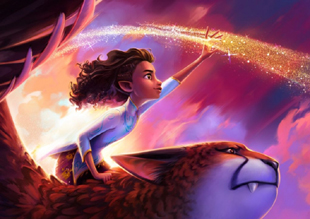
image c. 2023 Skydance Animation
Him and All His Furry… Friends?
Lots of people have been talking about the new anime-style TV series that just recently started streaming on Netflix. “Captain Laserhawk: A Blood Dragon Remix is an original animated series mixing alternative Ubisoft characters from beloved franchises such as Assassin’s Creed, Rayman, and Far Cry in a highly-referenced homage to the early 90s.” The story? “Set in the year 1992, the country formerly known as the USA is now called Eden, a technocracy ruled by propaganda and corruption. Super-soldier Dolph Laserhawk has just been betrayed by the love of his life, his boyfriend Alex Taylor, and locked up in Eden’s off-the-grid maximum security prison, Supermaxx. Dolph is forced to lead a team of rebel outcasts on risky undercover missions under the order of the prison’s shadowy Warden.” What that description fails to convey is that there are lots and lots of anthropomorphic characters throughout the series, mostly bad folks but a few good-ish ones. Check out the trailer over at Animation World Network.
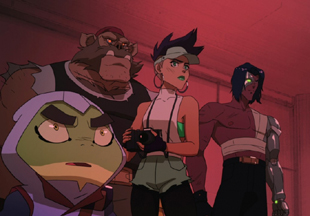
image c. 2023 Netflix
